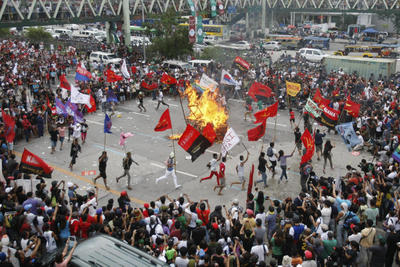In 2011, President Aquino successfully pushed for the impeachment and prosecution of then-Supreme Court chief justice Renato Corona for failing to legally disclose his assets and liabilities. Ironically, as Senate president, Enrile presided over the impeachment trial that declared Corona guilty. But Enrile’s ally Senator Estrada, the son of convicted plunderer and ousted president Joseph Estrada, managed to turn the tables against President Aquino by accusing him of using his own presidential pork-barrelling program, the Disbursement Acceleration Program (DAP), to bribe congressmen and senators to convict Corona.
Suddenly, the Aquino administration found itself on the defensive when the Supreme Court unanimously found the DAP unconstitutional. In a nationally broadcast address, President Aquino lashed out against the decision. Meanwhile, his allies in the House of Representatives threatened to abolish the Supreme Court’s own pork-barrel fund, the Judicial Development Fund (JDF). Critics of the president from the left and right have filed a series of impeachment complaints. Close to three decades since the Marcos dictatorship was ousted, the promise of good governance continues to elude the oldest democracy in the Southeast Asian region.
As in most developing countries, corruption has been one of the major impediments to development in the Philippines.
Practically all administrations have faced a major corruption scandal. Transparency International reported that Ferdinand Marcos stole a total of between US$5 billion to US$10 billion between 1972 and 1986. In the post-Marcos period, Joseph Estrada is the first Philippine president to be convicted of plunder for pocketing between US$78 million to US$80 million during his three-year presidency. His successor Gloria Macapagal Arroyo is under detention while facing trial also on charges of plunder.
The ongoing controversies over the PDAF and DAP underscore the persistence of two governance problem in the Philippines: institutionalised corruption and political clientelism. Despite efforts to combat and eradicate it at different historical junctures, corruption has continued to permeate national and local politics and governance.
The post-Marcos era opened the floodgates for the democratisation of corruption, allowing well-connected political operators like Janet Lim Napoles to pull off a multi-billion pork-barrel scam for several years through a well-spun web of connections with bureaucrats, legislators and other government functionaries.
But institutionalised corruption is only half of the story.
The other half involves political clientelism. The mobilisation and use of pork barrelling for clientelistic politics is one of the legacies of American colonial tutelage in the Philippines.
Aquino overwhelmingly won the 2010 presidential elections with his good governance and reformist narrative of ‘no corruption, no poverty’. However, the inability to rein in the twin problems of institutionalised corruption and political clientelism has limited his ability to put a dent in the bigger problem of poverty in the country. Worse, his perceived moblisation of clientelistic tactics, such as pork barrel politics to push for his anti-corruption agenda, has exposed the limits of his good governance rhetoric. Recently, the Supreme Court banned the use of pork-barrel funds.
Aquino’s ruling Liberal Party faces a dilemma of balancing power and principle: even if it’s a party of principle, without power it will not be able to realise its principles. But, if it focuses too much on power, it might end up losing its principles. The disconnect between Aquino’s reformist narrative and the current PDAF and DAP controversies has taken a toll on his once sky-high popularity ratings. The president found himself caught in a narrative trap where his governing script diverged dramatically from his campaign narrative.
President Aquino should take the current controversies as an opportunity to retell the narrative that earned him the people’s trust. In an emotion-filled State of the Nation Address this week, Aquino evoked the sacrifices of his parents — the martyred senator Benigno S. Aquino Jr and former president Corazon C. Aquino — in an attempt to relaunch his narrative.
But in order to salvage the remaining two years of his administration, he should focus his energies on delivering on the long-delayed promise of political reforms by passing pending bills on freedom of information, party development and the banning of political dynasties. He should also push for a new social reform agenda that will lay the grounds for more inclusive economic development.
His presidential legacy is on the line.
Julio C. Teehankee is Dean of the College of Liberal Arts at De La Salle University, Manila.

